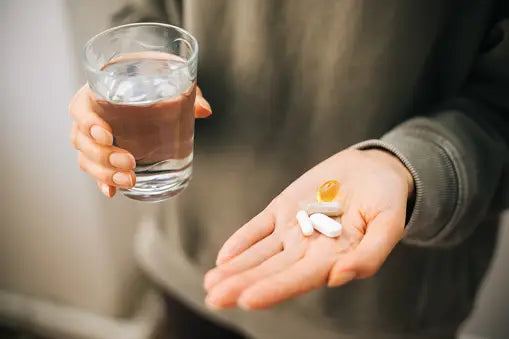Become an Alpha Athlete with This One Ingredient
Table of Contents

Become an Alpha Athlete with This One Ingredient
While produced endogenously, the primary source of beta alanine in humans comes from their diet. Meat is the primary source of dietary beta alanine, with highest concentrations found in chicken and turkey. Although meat is high in beta alanine, the amount of meat one would need to eat to get performance enhancing benefits from diet alone would not be sufficient.
A single cup of roasted chicken breast contains over 2 grams of the amino acid, while 3 ounces of cooked turkey breast supplies just less than 2 grams a serving. To duplicate the amount of supplemental beta alanine that showed a link between beta alanine and improved performance, you’d need to consume around 4 to 6 grams daily, or at least 2 cups of chicken breast and 6 ounces of turkey breast.
Previous studies investigating the effect of beta alanine on performance measures have shown improvements in total work completed, time to exhaustion, physical working capacity at fatigue threshold, attenuated fatigue during repeated bouts of resistance training, and final 30 second sprint performance during a 2 hour time trial. Researchers recently reported that short-term beta alanine supplementation is beneficial, but longer-term studies are lacking, so researchers wanted to examine what would happen to performance after 28 days of beta alanine supplementation. The really interesting aspect was they used older athletes, because a majority of the studies involving beta alanine have used younger subjects in their early 20’s.
Researchers examined the longitudinal effects of beta alanine on time to exhaustion, total work completed, and lactate clearance in older cyclists. Subjects were randomly assigned to 4 doses a day over 28 days of beta alanine (800 mg beta alanine + 8 g dextrose) or placebo (8 g dextrose) groups. Every 7 days, subjects completed a cycling time to exhaustion at 120 % VO2max, and total work completed were calculated. Blood lactate was measured at baseline, immediate post, and 20-minutes post each time to exhaustion.
At the end of the study, no significant differences existed between groups for any variable at baseline. After 28 days supplementation, beta alanine had greater time to exhaustion (23% for beta-alanine group vs. 1 % change for placebo) and total work completed (21% for beta alanine group vs. 2 % change for placebo). Following the 20-minute time to exhaustion recovery, lactate was 24 % lower in beta alanine compared to placebo. No differences existed for variables during intermittent weeks. 28 days of beta alanine supplementation increased cycling performance via an enhanced time to exhaustion and total work completed with associated lactate clearance during passive rest in mature athletes.
In addition to creatine, beta alanine seems to be a great way to enhance performance. The military is currently looking at beta alanine in soldiers for enhancing combat-specific performance. This appears to be most relevant for high-intensity activities lasting 60-300 seconds.

Glenn JM, Gray M, Stewart R, Moyen NE, Kavouras SA, DiBrezzo R, Turner R, Baum J. Incremental effects of 28 days of beta-alanine supplementation on high-intensity cycling performance and blood lactate in masters female cyclists. Amino Acids. 2015 Aug 9.
Stout JR, Cramer JT, Mielke M, O’Kroy J, Torok D, Zoeller RF: Effects of 28 days of beta-alanine and creatine monohydrate supplementation on the physical working capacity at neuromuscular fatigue threshold. J Strength Cond Res 2006, 20(4):928-31.
Stout JR, Cramer JT, Zoeller RF, Torok D, Costa P, Hoffman JR, Harris RC: Effects of β-alanine supplementation on the onset of neuromuscular fatigue and ventilatory threshold in women. Amino Acids 2007, 32(3):381-6
Stout JR, Graves BS, Smith AE, Hartman MJ, Cramer JT, Beck TW, Harris RC: The effect of beta-alanine supplementation on neuromuscular fatigue in elderly (55-92 Years): a double-blind randomized study. J Int Soc Sports Nutr 2008, 5:21.
Hill CA, Harris RC, Kim HJ, Harris BD, Sale C, Boobis LH, Kim CK, Wise JA: Influence of b-alanine supplementation on skeletal muscle carnosine concentrations and high intensity cycling capacity. Amino Acids 2007, 32:225-233
Zoeller RF, Stout JR, O’Kroy JO, TOrok D, Mielke M: Effects of 28 days of beta-alanine and creatine monohydrate supplementation on aerobic power, ventilatory and lactate thresholds, and time to exhaustion. Amino Acids 2007, 33(3):505-10.
Hoffman J, Ratamess N, Kang J: Effect of Creatine & β-alanine supplementation on performance and endocrine responses in strength/power athletes. Int J of Sport Nutr Exerc Metab 2006, 4:430-6.
Derave W, Ozdemir MS, Harris RC, Pottier A, Reyngoudt H, Koppo K, Wise JA, Achten E: Beta-Alanine supplementation augments muscle carnosine content and attenuates fatigue during repeated isokinetic contraction bouts in trained sprinters. J Appl Physiol 2007, 103(5):1736-43.
Kendrick IP, Harris RC, Kim HJ, Kim CK, Dang VH, Lam TQ, Bui TT, Smith M, Wise JA: The effects of 10 weeks of resistance training combined with beta-alanine supplementation on whole body strength, force production, muscular endurance and body composition. Amino Acids 2008, 34(4):547-554.
Van Thienen R, Van Proeyen K, Eynde B, Puype J, Lefere T, Hespel P: Beta-alanine improves sprint performance in endurance cycling. Med Sci Sports Exerc 2009, 41(4):898-903.
Smith A, Walter A, Graef J, Kendall K, Moon J, Lockwood C, Fukuda D, Beck T, Cramer J, Stout J: Effects of β-Alanine supplementation and high-intensity interval training on endurance performance and body composition in men; a double-blind trial. J Int Soc Sports Nutr 2009, 11:65-68.
MUSCLE MEDIA MAGAZINE FOR MEN
THE ALTERNATIVE TRAINING ISSUE
















